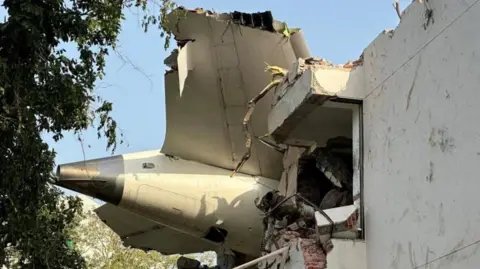Boeing fuel switches safe, regulator says after Air India crash
 Reuters
ReutersThe US aviation regulator has said fuel control switches in Boeing aeroplanes are safe, following their reported involvement in a fatal Air India crash that killed 260 people in June.
The switches' safety has become a key point of concern after a preliminary report on the disaster was released by investigators on Friday.
It said fuel to the Boeing 787-8 Dreamliner engines was cut off moments after take-off from Ahmedabad airport, and highlighted past reports by the US Federal Aviation Administration (FAA) that suggested the switches should be inspected for safety.
In an email seen by the BBC, Air India's boss warned against jumping to "premature conclusions" following the report's publication.
The disaster involving London-bound Flight 171 was one of the worst aviation incidents globally in almost a decade.
Onboard, 229 passengers and 12 cabin crew were killed while 19 people on the ground perished when the plane crashed. One British national survived.
Switches controlling fuel flow to the jet's engines had been moved from "run" to the "cut-off" position, hampering the thrust of the plane, according to the preliminary report, which was published by the India Aircraft Accident Investigation Branch (AAIB).
Investigators referred to a 2018 FAA advisory, which urged - but did not mandate - operators of Boeing models to inspect the locking feature of the fuel cut-off switches to ensure they could not be moved by accident.
This step was not taken by Air India, the AAIB said in its early findings.
The FAA on Friday told civil aviation authorities that it had seen AAIB's preliminary report.
It noted that its own 2018 advisory "was based on reports that the fuel control switches were installed with the locking feature disengaged" but added that it does not believe this makes the planes unsafe.
"Although the fuel control switch design, including the locking feature, is similar on various Boeing airplane models, the FAA does not consider this issue to be an unsafe condition that would warrant an Airworthiness Directive on any Boeing airplane models, including the Model 787," said the authority, in an internal note shared with the BBC.
"The FAA will continue to share relevant information with foreign civil aviation authorities as appropriate."
AAIB, which reviewed recovered cockpit voice recordings, reported that one pilot could be heard during the flight asking the other why he cut off the fuel.
"The other pilot responded that he did not do so," said the report.
Investigators said the fuel switches had almost simultaneously flipped from run to cut-off just after take-off. The report did not say how the switches could have flipped during the flight.
Air India chief executive Campbell Wilson has warned against drawing "premature conclusions" about the cause of the accident in an email to staff.
He said there was "an ongoing cycle of theories, allegations, rumours and sensational headlines" that had appeared over the past month, many of which had later been disproven.
The report, he stressed, had identified no cause for the accident, and nor had it made any recommendations.
"The investigation is far from over", he said. Investigators are expected to produce a more detailed report in 12 months.
Mr Wilson said: "We will continue to cooperate with the investigators to ensure they have everything they need to conduct a thorough and comprehensive enquiry."
Mr Wilson said the report had "found no mechanical or maintenance issues with the aircraft or engines", adding that all necessary checks had been carried out before the flight.
Nevertheless, extra checks had been carried out across Air India's 787 fleet within days of the accident "out of an abundance of caution". All were found to be fit for service, he said.
